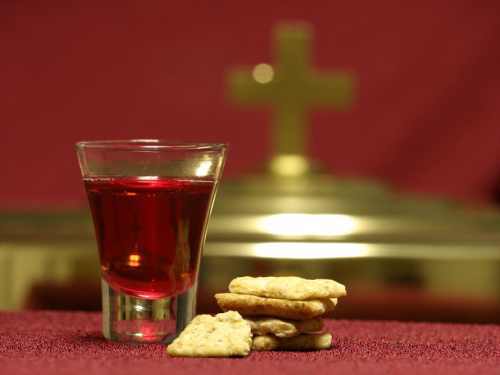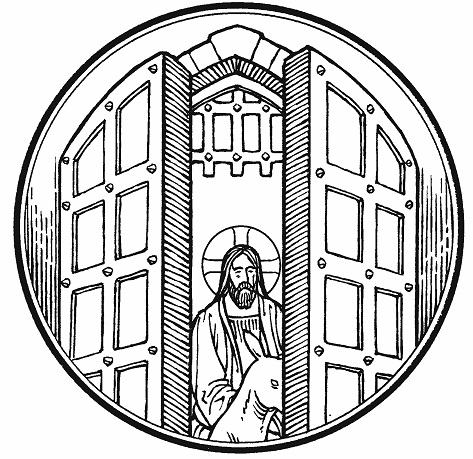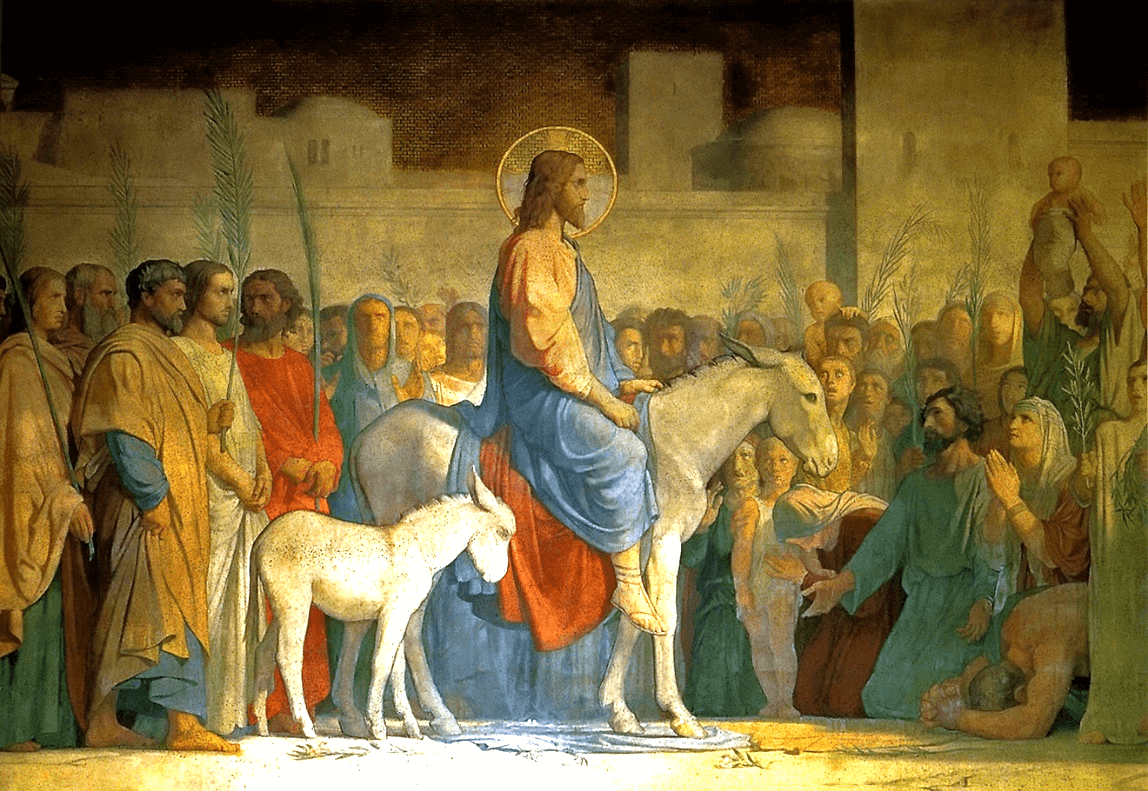~ Ad Te Levavi ~
Readings: Jeremiah 23:5-8 | Romans 13:(8-10) 11-14 | Matthew 21:1-9
Text: Matthew 21:1-11
Advent, as you may remember, means “coming.” Every year, we rehearse the coming of our Lord. Again, you may be familiar with His first coming in the flesh at Christmas, and His second coming on the Last Day. Today, however, as we begin this holy season, I’d like to focus on all the meanings of His coming, as we pray for it in the Lord’s Prayer. “Thy Kingdom come, on earth as it is in heaven.”

Herb Lindemann (1909-1995), a Lutheran pastor who wrote a series on the church year, writes that Advent can be described as a threefold coming:
“[1] The coming in the flesh, [2] the coming in glory and [3] the coming in grace. In Advent, the liturgy prepares for a worthy and proper commemoration of our Lord’s First Advent, the historical event that lies in the past. However, the church is not content to remind her children of only a past event that can be called to remembrance, but cannot be experienced in the first coming. She sees a picture of the invisible coming in grace, which can be and is experienced in the present, and of the visible coming in glory, which will be experienced in the future.”[1]
So, these are the three ways the Kingdom of God comes to us:
Our Lord comes in the flesh, entering the world He made (John 1:1-14). This is what Christmas celebrates, and the “reason for the season” as we say. We have reason to rejoice with everyone from angels to shepherds, and sing of this good news of great joy! Now, don’t get me wrong, but it’s in some ways unsatisfying. What I mean is, we commemorate the Lord’s birth, but it’s also an event that is disconnected from us by thousands of miles and by millennia of history. Over the centuries, Christians have tried to overcome that barrier by depicting Christ and the scenes of His birth in familiar settings, portraying him with familiar physical features. But it remains that the birth of Christ is a historical event. As the world gets further and further from that point (even to the point of writing His birth out of how we number years, preferring CE—common era—over anno Domini—in the year of our Lord), it takes more of an effort to have this history impact our present, day-to-day life.

His Kingdom also will come in glory. This is certain, and we look forward to it. But it will come when God the Father appoints. No man knows the day or the hour, although many have falsely claimed to pin down the date. We see the eagerness of believers for the end, when events in the world get really bad, or there is turmoil in the “Holy Land” (as Israel is called). Putting the best construction on people’s obsession with the Return of Christ, they are longing for eternity to break into the crumbling world. They want the doldrums of this futile life to be blown apart and something permanent to replace it. As Hebrews reminds us, “He has promised, ‘Yet once more I will shake not only the earth but also the heavens.’” (Hebrews 12:26, citing Haggai 2:6) But this, too, leaves us waiting. Not to sound impious, but where is the satisfaction from God now? Or, in the words of the faithful who have gone before us, “O Sovereign Lord, holy and true, how long before you will judge and avenge our blood on those who dwell on the earth?” (Rev. 6:10)
What we have been given is the Kingdom of grace. The Kingdom of Grace is here with us now! Yes, we know that we have peace with God, forgiveness in Christ. There’s more than that, though. We suffer from a love of reason over revelation. Our reason tells us about the days and years, about the illnesses and pains of our life, about the turmoil in the world. So, we pray that God would take these things away—and do so quickly! We tell Him that if these things aren’t taken away quickly then we will certainly be driven to despair, beyond our ability to bear. It’s too much, God!
This is what our reason tells us, but God reveals a better reality. In this Kingdom of Grace, He Immanuel—God with us. Not just in the memory of the past, or the steadfast hope for the future. He is presently with us, just like He promised: “Behold [that is, pay attention!], I am with you always, even to the end of the age.” (Matt. 28:20)
Our King comes to us, but it’s not in ways that reason can grasp. This is why Jesus said to His disciples before His passion,
“18 “I will not leave you as orphans; I will come to you. 19 Yet a little while and the world will see me no more, but you will see me. Because I live, you also will live. 20 In that day you will know that I am in my Father, and you in me, and I in you. 21 Whoever has my commandments and keeps them, he it is who loves me. And he who loves me will be loved by my Father, and I will love him and manifest myself to him.” (John 14:18-21)

Jesus is saying that the way He is with us now (the Kingdom of Grace) is through His Word and the Holy Sacraments. The world does not see these. Instead, it hails reason as the measure of all truth and reality.
Our present age believes the promise that if we just have access to enough information, we will be able to overcome all obstacles. This is the pride of the worship of Science, which says if scientists are just given more time and money, and they will be able to solve all things, and unlock all mysteries.
But it is not information that our Lord gives us, but a Kingdom. It is a Kingdom built for faith. What He gives to His faithful is enough for the weariness of this age. The Father of Lies would like you to believe that the Christian faith is only adequate for simpler times and olden days. But the way that the Lord is present with us, in this Kingdom of Grace, it is enough.
The Lord adds more to His promise to be with us always—through this time—to the end of the age. He says that His Kingdom comes in Baptism—as surely as He said, “Truly, truly, I say to you, unless one is born of water and the Spirit, he cannot enter the kingdom of God.” (John 3:5) That’s personal and tangible. It happened on a certain date, in a place, by a certain servant of Christ. Imagine that: The Lord doesn’t just speak from heaven; He works here on earth, through human hands. It’s the same thing He was doing to preserve His Word to us, so should we be surprised? What better can we ask of the Kingdom of Grace than what He gives to us?
All of these modes of God’s Kingdom work together, and none is better or more necessary than the other. They all have their time. Coming in the flesh, “In the fulness of time, God sent for His Son, born of woman, born under the Law, to redeem those under the Law, so that we might receive adoption as sons” (Galatians 4:4-5) And the Coming in glory, “Therefore you also must be ready, for the Son of Man is coming at an hour you do not expect.” (Matt. 24:44) What we need now is the Kingdom of Grace. Now is the day in which God forgives our sins and strengthens us through His appointed means—the Sacrament of the Altar and the Absolution. Now is the time when He invites people into His Kingdom in the saving washing of Baptism (Titus 3:5-7).
So how can we remain in this Kingdom of Grace? By turning away from the deceit of our own hearts, the deceit of this present world. This is why we practice Advent. It is a necessary reminder of the proper order of His Kingdom coming. Yes, the Lord has brought His Kingdom among us in the flesh. Yes, the Lord will bring His glorious Kingdom when the Day is come. But most of all for us, we rest on the truth that His Kingdom of grace comes, just like we’ve prayed for.

Let us pray:
Worthy are You, our Lord and God, to receive glory and honor and power, for You created all things, and by Your will they existed and were created. Give us the faith to behold the majesty of Your presence in simple words, simple water, and simple bread and wine, as You come to us in the very body and blood of Your Son, Jesus Christ, our Lord, who lives and reigns with You and the Holy Spirit, now and forever. (16 December)
In the Name + of Jesus. Amen.

[1] Lindemann, Frederick, “Sermon and Propers” (vol. 1, page 29)



